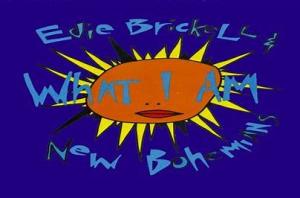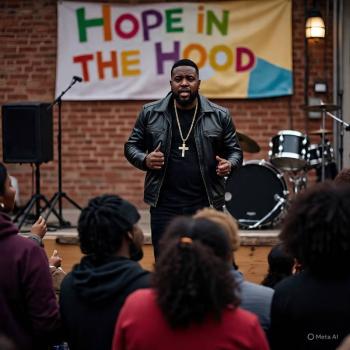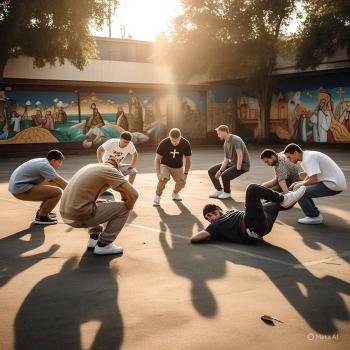
Edie Brickell and the New Bohemians, “What I Am”
“Really? Is That What You Are?” Reading Edie Brickell
The song has a catchy rhythm, I’ll give it that. The lyrics are simple enough to follow and sing along to almost immediately. A good idea for a pop song. The band has an interesting name, “New Bohemians.” It’s just vague enough not to question, yet intriguing enough to make fans feel connected to a spirit of adventure. Was the song a chart topper? Ranked number four on Billboard’s album chart. Edie Brickell is the quintessential American singer-songwriter who, well, is simply there. We know her voice, we’ve seen her image, and her songs hang in our memories. But that’s about it. Not too much, not too little, a middle of the road pop artist who got us through our early 20’s growing pains. It’s this one song plastered on the cultural wall we return to from time to time. Why? What does that song have to say that already hasn’t been said? What profound statement is Edie Brickell trying to make, if any, in this work? All good questions that have been left rhetorical for some time – the song was originally released in 1988. If Brickell has a point to make, let’s see what can be unearthed. Any song that tries to link religion and philosophy together, side by side, deserves a critical review
A socio-religious extractivist reading
Edie Brickell links philosophy and religion together at two points in the work. The first time we hear,
Philosophy/ is a talk on a cereal box/ Religion/ is a smile on a dog
This is followed with,
I’m not aware of too many things/ I know what I know/ if you know what I mean
Brickell exposes a personal point without any qualifiers. Philosophy is framed as a token of culture, meaningless and trivial, nothing to be taken seriously. Religion is framed in a similar manner, a signifier of happiness caught in a three-dimensional reality for all to see and pass without any second thought. Being clever, Brickell inverts the spelling of “God” as “dog.” This literary inversion highlights Brickell’s interest in religion, it’s a pet for personal comfort, always present yet not to be taken seriously. Both philosophy and religion, for Brickell, function on a similar plane, objects of consumerism and absent of depth or interest.
Then, Brickell justifies her contextualization of philosophy and religion when she notes she’s not aware (read: interested) in knowing beyond what she knows on a pop cultural surface level. In two simple lines, Brickell acknowledges and ties together the blackhole in contemporary pop culture, there’s no desire to delve below the surface to grasp the hermeneutics of either of these disciplines. Brickell’s tautology of philosophy and religion is the established pop culture vernacular connecting philosophy with religion. What is not qualified in these lines is spirituality. Religion, here, replaces and essentializes scripture doctrine for a lackluster practice, a common event mechanically exercised. Keeping the argument isolated to her own beliefs – “I know what I know” – Brickell sidesteps the necessity to clarify that religion is an external expression where spirituality frames one’s faith-based ideology. Likewise, philosophy, for Brickell, is codified as an abstract “other.” She objectifies philosophy as an external component and then hinges it to her one-dimensional understanding of religion, removed from a faith-based foundation.
Choke me in the shallow waters/ Before I get too deep
Brickell is comfortable thinking on a shallow level rather than engaging in the required discipline of socio-religious hermeneutics. Brickell articulates pop culture’s relationship and misunderstanding of both philosophy and religion. The terms are tossed around as academic filler in the uneducated pop culture discourse. To be “choked,” then, underscores Brickell’s archetypal theme, there’s no need to invest time or interest in either of these disciplines; it’s just not worth it.
The linger phrase, “doo-yeah” (read: Do You) does not have a question mark to close the thought. This pesky colloquial phrase is used by Brickell as code to subconsciously lull the listener into her argument. “Doo-yeah” (read: Do You) drops a call to action in acceptance of Brickell’s argument. If this is not given attention the listener appropriates Brickell’s points and personally qualifies each in line with their own insular relationship to philosophy and religion. These mutually exclusive areas of culture are bonded together and rooted in pop culture’s psychology.

Founding Reversal
As the song continues, the second verse positions philosophy as a “slippery” step on a firm foundation. “Religion” is qualified as a “light” in a dimly lit environment.
Philosophy is a walk on the slippery rocks/ Religion is a light in the fog
This is the closest point we hear from Brickell that there is depth to both these disciplines. Philosophy’s structure is metaphorically defined as stable, firm, yet the walk (read: engagement with the discourse) is not firm and threatening. To “walk” on philosophy (read: engage with the discourse) is to risk falling and getting hurt. The subtext reads, “Why even bother if you know the risk of getting injured?” Brickell appears to be at first supporting the necessity for man to endure the rigor of philosophy. The twist in the phrase is that there is a high risk of danger to unfold. Following Brickell’s earlier contextualization of philosophy, pop culture gathers that there’s no need to endure philosophy and should stay clear of those “slippery rocks.”
“Religion” has an interesting position in this second verse. Symbolically presented as the proverbial “light in the fog,” Brickell appears to be qualifying the importance for a religious practice, any religious practice, to be viewed as a beacon of hope. The space between the observer and the light is left vague. How bright is the light in the fog that religion provides? How well do we see in the fog (read: consumption culture) that surrounds us? Where are we in that fog? The lack of these qualifiers opens the door for an ambivalent relationship for one, not toward religion – which is a categorical term for a disciplined exercise – but toward a spiritual doctrine. The ability for a socio-religious engagement to exist in this ambivalent space promotes a direction for pop culture to see and follow a “light” toward a spiritual relationship with a faith-based doctrine.
What reduces any level of importance in Brickell’s seemingly potential direction for pop cultural survival away from getting “too deep” or “chocking” in the “shallow waters,” Brickell’s smug smile essentializes the importance of philosophical pedagogy and man’s desire for a firm faith-based personal relationship with God.
Brikcell frames her argument for a limited essentialistic reading of philosophy and religion as one defined by man’s own ideological understanding. This serves as a prime textbook reading of modernism. When afforded the opportunity by way of a resounding post-modern contextualization, Brickell rejects this point by trivializing the importance of philosophy and strays away from supporting man’s relationship to God. She marginalizes these by way of her own self-defined proclamation of identity as authority. The justification for neglecting philosophy, for Brickell, is the overtly trivial nature of the discipline and it would be harmful to engage. Religion is self-articulated in a similar tokenized fashion. Religion is used incorrectly to define spirituality. Religion holds no faith-based ideological standard, whereas spirituality is founded on an inner, active relationship with God. This distinction is overlooked by Brickell who offers quip cultural signifiers to define religion while neglecting the faith-based spiritual application.
Brickell’s repetitive phrase”What I am” removes discipline and God from the conversation to center identity as the overarching arbiter, a highly modernist reading of identity, limited in all manifestations.

Counter Culture
Viveiros de Castro, ethnographer and anthropologist discusses how critical anthropological thought helps dislocate assumptions of culture, in this case a close reading of how socio-religious issues are contextualized for public consumption. In his book Cannibal Metaphysics, de Castro notes the complications between the study of culture (anthropology) and its expressions for understanding these complex relationships (philosophy, spirituality).
“[T]he problems, terms, methods, political situation, and intellectual disposition of a thinking no longer complacently satisfied with neglecting concepts external to the West and thereby conceptually mimicking the moderns’ violent absorption of other peoples, by presuming that such ideas can always be reduced back to their own.”
Applying this concept to the work by Brickell, “What I Am,” one need go no further than the hook of the work,
What I am/ is what I am, you/ Is what you are/ or What?
Brickell assumes that what she is (read: knowledge of cultural relationships) equates to what we all are. Proper philosophical and socio-religiously framing this point is an essentialist reading of culture. The importance of a personal connection and the dynamics a pedagogical discipline in philosophy and a core relationship with God are discredited for an insulated essentialist perspective.
Brickell continues asking “What you are, or what?” Her personal discourse of self is projected onto the listener as authentic. The last point, “or what?” operates to fortify her concrete point of “knowing” yet challenges you, the listener, to question your connection with philosophy and the value of a socio-religious spiritual relationship. Ending with the question, linguistically, promotes Brickell’s essentialist reading of self in a dominant position. The question is rhetorical and diminutive to the observer. Brickell states that her points are correct and an authentic view of culture that need to be consumed by the listener. The circular nature of her text plays a fool’s game with the observer, keeping their perspectives of philosophy and a spiritually grounded relationship with God as a question rather than a foundation.
The opening lines,
I’m not aware of too many things/ I know what I know/ if you know what I mean
establishes her point of view in an authentic and dominant position. The light tone of her voice and the ease with which Brickell floats this significant point can be overlooked and absorbed unconsciously. It is this hypnotic strategy Brickell employs that the larger secular community exploits as the justification to challenge philosophic inquiry and a socio-religious, scripture-founded understanding of culture. Brickell discredits philosophy through language, tone, and expression in the song/video. These subconscious articulators become seeds for internal debate over the relevance of philosophy in contemporary society.
Brickell’s linguistic exchange of religion for spirituality is a commonly practiced misunderstanding. The fortification in scripture as a means to read contemporary culture – a critical socio-religious anthropological contextualization – is here trivialized, challenged, and discredited by Brickell through continued secular post-modern positioning. The initial inversion of the word “God” as “dog” collects an artifact of reference from pop culture. A personal socio-religious spiritual doctrine grounded agenda to critique pop culture is left out of the overall perspective. Brickell exploits religion as a consumer item while textually misrepresenting and misappropriating it as a definition of spirituality.
“What I Am” is founded on a few simple lines, narrated in a circular argument to confuse, reduce, and assimilate philosophy and a scripture-founded discipline into an amalgamation of pop cultural practices. Philosophy demands its critical discursive reading and application on its own merits. A firm Christian/faith-baed ethic is, through Brickell’s essentialist reading, a minor principle in the company of all other global religions.
The cyclic construction of the lyrics is appealing to an uncritical observer which satisfies a reductive nature of pop culture. Deconstructing Brickell’s philosophical hesitation firms the institutionalized bias against the vast field of study. Reading Brickell’s text through a critical Christian/faith-based lens the argument being made is inconsistent with scripture doctrine which frames a personal relationship with God. Brickell keeps her arguments terrestrial. The ethical importance and value of understanding how philosophy relates to the present cultural environment is necessary in broad scope for culture to thrive. A critical socio-religious Christian/faith-based analysis moves the argument – and defense – as one founded on sound doctrine and scripture.
To answer Brickell’s point, “What you are, or what” has no gravity following this analysis. The lyrical gymnastics Brickell performs may be stunning to a large pop cultural audience, but it is a mere spectacle when philosophically and socio-religiously faith-based critiqued.














